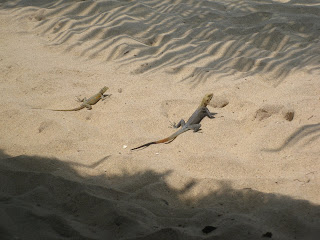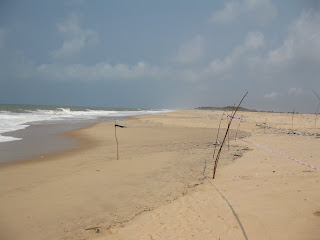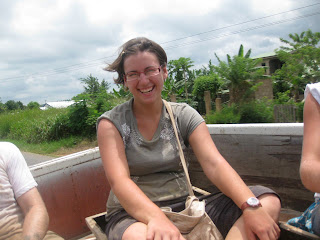...this post was written before I left Accra... over a week ago... I am now back in the Hills... and loving it!!!..
Last Wednesday I moved to Accra. Being in Accra has allowed for a great deal of what life is like in the capital, to life in rural Ghana. I have to say, I prefer rural Ghana. Fortunately though, my time in Accra is almost up, as I will be moving back to the hills on Wednesday to spend my final two weeks in the country helping to build an orphanage in Kwamoso. Before I left though, I thought it would be good to summarize what a different experience volunteers get being in the Capital.
Safety
Safety is a big issue living in the capital. Although Ghana itself is considered to be quite a safe country, the most stable West African country at that, Accra is not the safest place to be. Although the crime and violence doesn’t nearly compare to that of Johannesburg or Lagos, in more recent years, crime has been rising in Accra. The place I am living, although not the worst, is still not the safest place to be. The day I got here my roommates casually told me about how the previous week on two separate occasions volunteers had been mugged on my street, one at knife point, the other punched in the face and knocked to the ground. Although I have not been mugged her, my roommate and I have been followed when walking the two blocks home from a chop bar after dark. Back in the hills, being mugged is unheard of, and you’re biggest worry is not tripping over a rock and falling on your face after dark.
Healthcare
When I worked at Tetteh Quashire, I was working at a district hospital run by the state. Because of this, the hospital was lacking in many needed resources, and lives were and are still being lost, just because the hospital is not fully equipped. The Trust Hospital in Accra (where I am now working, albeit for a short period time) is a hospital run by SSNIT (Social Security and National Insurance Trust) and people have to pay to be seen there. It is the first hospital I’ve seen that I wouldn’t be absolutely terrified of being sick in. Although I was suppose to spend my entire time in at the Trust Hospital in general surgery, due to an administration error, I spent my first two days in the OPD, which allowed for an eye opening comparison of the forms of healthcare available in Ghana. At the Trust Hospital, not only does it seem that they have quality physicians, but they also have the resources there for the physicians. Blood tests, and urine and stool samples were almost every patient occurrences, and treatment was not prescribed until results were obtained. Chest x-rays were ordered for every suspicious cough or sore rib, and if results weren’t satisfactory, the patient was then sent for a CT (care difficult for a patient in Canada to even receive). However, like I mentioned previously, you have to pay for the medical care here, and most Ghanaians can’t afford to be sick here (although the bills I saw were mere pocket change compared to what you would have to pay for the same service in the States) and instead have to rely on the underfunded and overworked state hospitals for their medical care. It is also very interesting that with a more westernized hospital, comes some of the westernized politics. At the end of each day in the OPD drug reps (for drugs I have actually heard of) would try to sell the doctors on how they should put their patients on their drugs. One of the doctors even went as far as to say that they’d put all their patient in a particular study on the rep’s drug, if the drug company would pay for all the lipid profiles of the patients during the study [insert ethical judgment of your own here].
The People
Ghanaians
I don’t know how much can be contributed to my growing prejudice towards this city, but the Ghanaians in Accra seem different than those I have met elsewhere in Ghana. For once, walking down the street as a white person doesn’t make you an immediate celebrity. I have only been called obruni on a rare occasion here, as the locals here are more likely to call you “white lady” if they acknowledge you at all. Although obruni and white lady mean the same thing, I do prefer the term obruni, as it almost always had had a friendly meaning behind it, whereas those who call you white lady on the streets of Accra tend to be looking to get something from you (be it a phone number, an address, or money). Because of this, as well as knowingly being a target for crime here, I have come to not trust the Ghanaians I meet on the street in Accra. It is unfortunate, as in the midst of those who see only dollar signs in my eyes, I am probably also dismissing some who are really only looking for a friend to talk to.
The Volunteers
There are currently some 60 Projects Abroad Volunteers spread out through Accra working on various projects. That being said, my perspective of the volunteers in Accra may be somewhat skewed, as I have only met 5 of them (and 3 of those I met during my orientation session to Accra). However, from the little I have seen, I find the volunteers in Accra to be much different from those that you find in the Hills. Perhaps it is not the volunteers themselves, but rather the environment, as Accra is unique in itself, a place where bucket showers meet hair straighteners, where bread and egg ladies meet supermarkets. One of my roommates talked of how her and the other volunteers go to Ryan’s Pub (an Irish pub with 8.50 cedi drinks) every night and how she gets pizza from Koala for lunch, or will grab a cheese baguette. It’s an odd sort of mix of some western conveniences and African flare. But I sort of feel sorry for the volunteers in Accra, as Accra is so different from the rest of Ghana, and they’re not really getting the true African experience by being there, and that’s definitely not how I want to spend my last couple weeks in Ghana, and thus the Hills here I come! (again)
My Host Family
The one regret in leaving Accra is leaving my host family. While in Accra I have been living with the Wolfe family. Mr. Wolfe (who is somewhere beyond 70, although he never told me his exact age) is a retired mechanical engineer and Mrs. Wolfe (63) is a schoolteacher at a catholic high school. The Wolfe’s are one of the original projects abroad host families, and I was very glad I got to stay with them while in Accra. They are a complete 180 from the family with in Mampong. The first day I got to Accra, I ended up talking for over an hour about astrology, religion, and other random topics. It was quite a shock to have a host family that actually talks to you, as my longest conversation with Frank in Mampong was perhaps 2 sentences (and that only happened once). Mrs. Wolfe was also incredibly nice. On Saturday afternoon, after I saw Obama, we got to talking, probably for 1-1.5 hours about nothing in particular. At one point she asked about what Ghanaian food I have tried here, and what I have and have not liked. I told her that I quite liked banku, and absolutely love groundnut soup. After we finished talking I went back to my room and heard a knock on my door about half an hour later. It was Mrs. Wolfe, saying that she had some banku and groundnut soup for me. I was so surprised, and so grateful, as that is something that would have never happened with my host family in Mampong. The night before I left, my host family gave me rice and groundnut soup (even though that isn’t one of our regular meals), just because I like it so much. If I could have transported that family back to the Hills with me, I think my stay in Ghana would have been absolutely perfect!









 After walking for only a short time, I came to a large sandhill and decided to climb up it to see he view.
After walking for only a short time, I came to a large sandhill and decided to climb up it to see he view. 










































